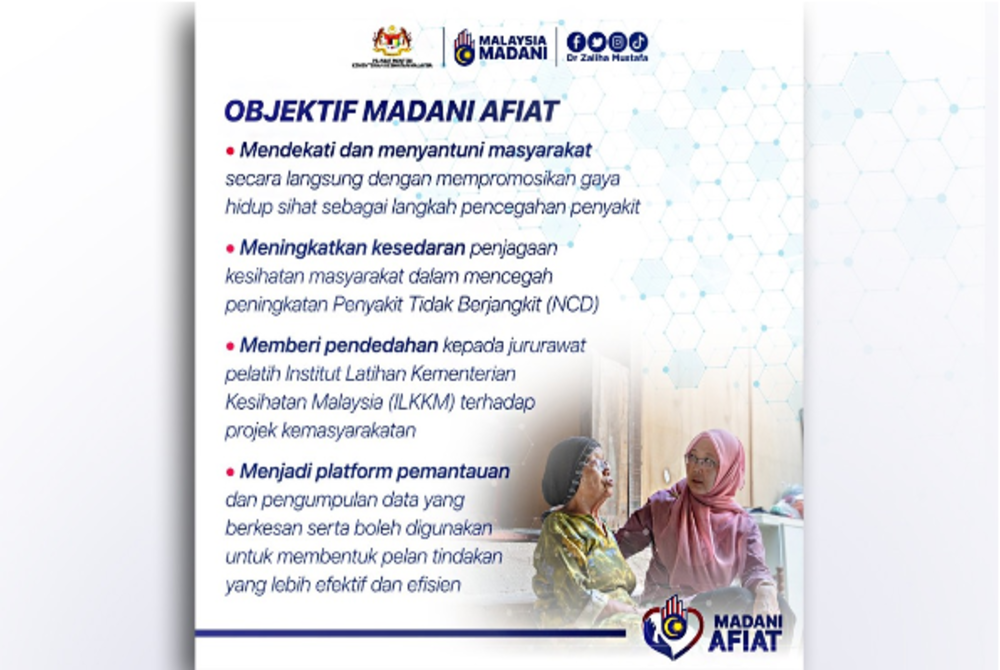Budget 2024: Expand Madani Medical Scheme, NCD preventions - Healthcare associations

KUALA LUMPUR - Healthcare-related associations hope that the government will allocate more funding to expand the Madani Medical Scheme and for the prevention of non-communicable diseases (NCDs), under Budget 2024.
The Malaysian Medical Association (MMA) president Dr Azizan Abdul Aziz said the scheme has helped to decongest the public healthcare system, through partnerships with private general practitioner (GP) clinics, and should be expanded to include NCD management.
Dr Azizan said that NCDs have become a national concern, and as such, she hoped to see more allocations to step up preventive measures, with funds to support health education programmes and awareness campaigns for the public in schools and at the community level.
"The government should leverage the 13,000 private GPs nationwide in these efforts. Involving all key stakeholders from the planning stages must be emphasised for the successful implementation of any public-private initiatives.
"As part of national efforts to prevent cases of obesity and diabetes, taxes high in sugar products should also be raised, with revenue collected channelled towards the treatment of diseases associated with high sugar intake,” she said.
Meanwhile, Malaysian Association for the Study of Obesity (Maso) president Dr Geeta Appannah hoped that the healthcare allocation of Budget 2024 gives priority to studies of obesity, to ensure that individuals benefit from effective interventions.
She said studies on obesity interventions and prospective areas are currently lacking and should be conducted as most studies are cross-sectional, but fail to find the real cause of obesity.
Besides increasing the risks of several debilitating diseases and mortalities, she said that obesity decreases quality and life span, while also increasing individual and national healthcare costs.
"Having said that, the good news is that weight loss can curtail some obesity-related risks. However, more efforts are needed to increase awareness and education about obesity in the country, and this needs to include all age groups.
"Extra allocation in the public health field to empower people and communities to take action on obesity is a good start, nonetheless it is important to note that awareness alone will not bring the prevalence of obesity down, as it only answers one part of obesity complexities,” she explained.
On Sept 8, Deputy Health Minister Lukanisman Awang Sauni said that 73 per cent of deaths in Malaysia are caused by NCDs, with nearly half of Malaysians being unaware that they have the disease, which leads to a higher risk of complications when not treated early.
The 2019 National Health and Morbidity Survey found that, among others, one in two adults is overweight or obese, with the highest prevalence among women at 54.7 per cent, and individuals aged 55 to 59 at 60.9 per cent, while one in three Malaysians has low health literacy, as evidenced by unhealthy and inactive lifestyles, not eating adequate amounts of fruit and vegetables, and smoking.
Meanwhile, Malaysian Public Health Physicians’ Association (PPPKAM) president Datuk Dr Zainal Ariffin Omar suggested that the government require employers to provide periodic health screening packages to their employees.
"Budget 2024 should entail healthcare incentives which facilitate employees to go for check-ups periodically, stay healthy and have a good safety net,” he said.
The health sector received the second-largest allocation, of RM36.3 billion, in Budget 2023. The Madani Medical Scheme received an allocation of RM100 million. - BERNAMA










